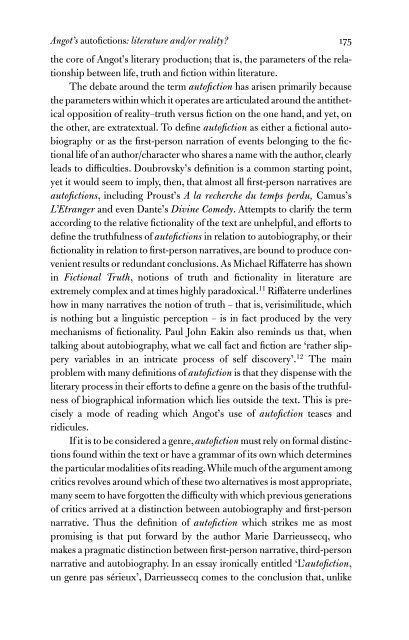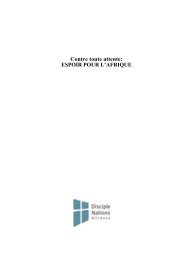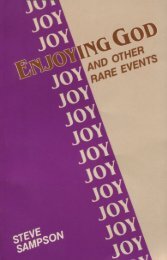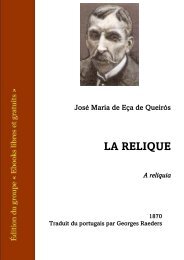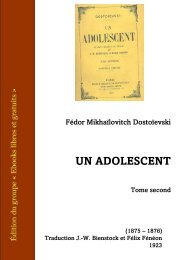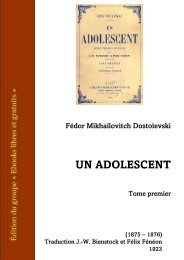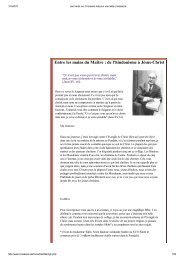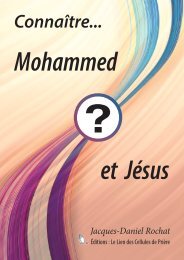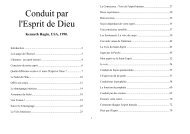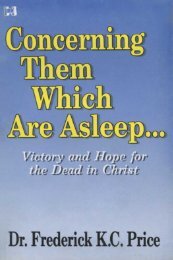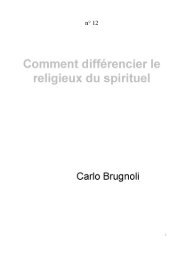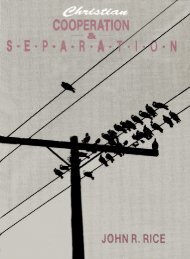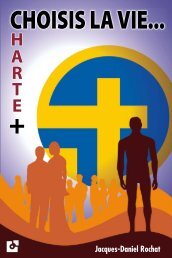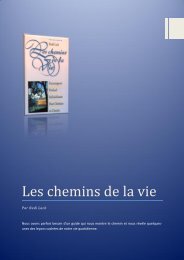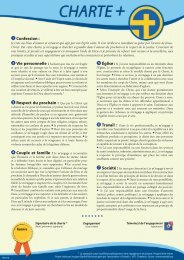Women writing in contemporary France
Create successful ePaper yourself
Turn your PDF publications into a flip-book with our unique Google optimized e-Paper software.
Angot’s autofictions: literature and/or reality? 175<br />
the core of Angot’s literary production; that is, the parameters of the relationship<br />
between life, truth and fiction with<strong>in</strong> literature.<br />
The debate around the term autofiction has arisen primarily because<br />
the parameters with<strong>in</strong> which it operates are articulated around the antithetical<br />
opposition of reality–truth versus fiction on the one hand, and yet, on<br />
the other, are extratextual. To def<strong>in</strong>e autofiction as either a fictional autobiography<br />
or as the first-person narration of events belong<strong>in</strong>g to the fictional<br />
life of an author/character who shares a name with the author, clearly<br />
leads to difficulties. Doubrovsky’s def<strong>in</strong>ition is a common start<strong>in</strong>g po<strong>in</strong>t,<br />
yet it would seem to imply, then, that almost all first-person narratives are<br />
autofictions, <strong>in</strong>clud<strong>in</strong>g Proust’s A la recherche du temps perdu, Camus’s<br />
L’Etranger and even Dante’s Div<strong>in</strong>e Comedy. Attempts to clarify the term<br />
accord<strong>in</strong>g to the relative fictionality of the text are unhelpful, and efforts to<br />
def<strong>in</strong>e the truthfulness of autofictions <strong>in</strong> relation to autobiography, or their<br />
fictionality <strong>in</strong> relation to first-person narratives, are bound to produce convenient<br />
results or redundant conclusions. As Michael Riffaterre has shown<br />
<strong>in</strong> Fictional Truth, notions of truth and fictionality <strong>in</strong> literature are<br />
extremely complex and at times highly paradoxical. 11 Riffaterre underl<strong>in</strong>es<br />
how <strong>in</strong> many narratives the notion of truth – that is, verisimilitude, which<br />
is noth<strong>in</strong>g but a l<strong>in</strong>guistic perception – is <strong>in</strong> fact produced by the very<br />
mechanisms of fictionality. Paul John Eak<strong>in</strong> also rem<strong>in</strong>ds us that, when<br />
talk<strong>in</strong>g about autobiography, what we call fact and fiction are ‘rather slippery<br />
variables <strong>in</strong> an <strong>in</strong>tricate process of self discovery’. 12 The ma<strong>in</strong><br />
problem with many def<strong>in</strong>itions of autofiction is that they dispense with the<br />
literary process <strong>in</strong> their efforts to def<strong>in</strong>e a genre on the basis of the truthfulness<br />
of biographical <strong>in</strong>formation which lies outside the text. This is precisely<br />
a mode of read<strong>in</strong>g which Angot’s use of autofiction teases and<br />
ridicules.<br />
If it is to be considered a genre, autofiction must rely on formal dist<strong>in</strong>ctions<br />
found with<strong>in</strong> the text or have a grammar of its own which determ<strong>in</strong>es<br />
the particular modalities of its read<strong>in</strong>g. While much of the argument among<br />
critics revolves around which of these two alternatives is most appropriate,<br />
many seem to have forgotten the difficulty with which previous generations<br />
of critics arrived at a dist<strong>in</strong>ction between autobiography and first-person<br />
narrative. Thus the def<strong>in</strong>ition of autofiction which strikes me as most<br />
promis<strong>in</strong>g is that put forward by the author Marie Darrieussecq, who<br />
makes a pragmatic dist<strong>in</strong>ction between first-person narrative, third-person<br />
narrative and autobiography. In an essay ironically entitled ‘L’autofiction,<br />
un genre pas sérieux’, Darrieussecq comes to the conclusion that, unlike


